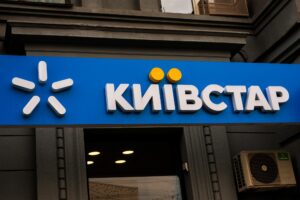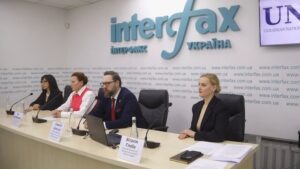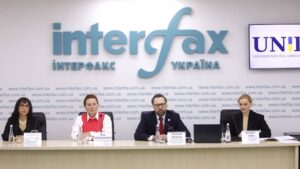
Ukrainians in October this year purchased 3.114 thousand cars imported from China, which is 2.6 times more than in the same month last year, according to “UkrAutoprom” in the Telegram channel. It is noted that mostly purchased passenger cars from China were new – 2.512 thousand units, which is 2.6 times more than last year. Demand for used cars also increased more than 2.6 times – 602 units were imported.
The absolute majority of passenger cars from China were electric cars – 92%.
The most popular models of new cars of Chinese origin are Volkswagen ID.UNYX – 441 units; BYD Song Plus – 391 units; BYD Leopard 3 – 261 units; Zeekr 7X – 169 units; BYD Sea Lion 07 – 150 units.
The most frequently purchased used cars were Zeekr 001 – 57 units; BYD Sea Lion 07 – 45 units; Volkswagen ID.UNYX – 36 units; Zeekr 7X – 33 units and Audi Q4 – 30 units.
As reported, in January-October this year, China was among the top three countries from which Ukraine imported passenger cars after Germany and the U.S. with a share of 13.8% of total imports or $663 million, while for the same period in 2024 was not included in the top three.
For the whole year 2024 Ukrainians bought about 14.4 thousand imported autos from China – 18% more than in 2023. Demand for new cars increased by 37% – up to 11 thousand units, while demand for used cars decreased by 20% – to 3.3 thousand.
In addition, according to “UkrAvtoprom”, in October-2025 Ukrainians bought more than 5.8 thousand used cars imported from the U.S. – 2.2 times more than in the same period of 2024.
The largest share of this number (49%) – electric cars, while the share of gasoline cars was 36%, hybrid cars – 8%, diesel cars – 4%, cars with SBB – 3%.
The average age of “Americans” with mileage, added to the Ukrainian car fleet in October – 5.2 years.
The top five most popular used cars made in the USA are Tesla Model Y – 900 units; Tesla Model 3 – 841 units; Ford Escape – 408 units; Nissan Rogue – 273 units; Tesla Model S – 270 units.

The level of outages is now one of the highest since the summer of 2024, resulting in over 30% of the network of the largest mobile operator Kyivstar being without power, says the company’s CEO Alexander Komarov, advising fixed internet users to ensure they have backup power for their routers so that everyone can stay connected for longer.
“Today is a very difficult day. One of the most difficult since the summer of 2024. As of 9 a.m., more than 30% of the network is without power, almost evenly distributed across the country. Five regional technology centers are running on generators,” Komarov wrote on Facebook on Thursday morning.
According to him, for the most part, the network has been running on batteries and generators for most of the day. “Unfortunately, about 4% of sites have lost their functionality,” the CEO said.
He recalled that in preparation for prolonged blackouts, the company had reserved 99% of the Home Internet network for up to 12 hours of autonomous operation before the start of autumn, installing more than 80,000 modern LiFePO4 batteries and investing almost UAH 300 million in this in 2024-2025.
“This way, when there is no electricity, the fixed network remains operational. But in order to use the Internet for as long as possible, subscribers should do their part of the ‘backup’ — connect their routers to a backup power supply. A power bank, uninterruptible power supply (UPS), or charging station will suffice,” Komarov explained.
At the same time, according to his data, as of mid-November, only 15-20% of Home Internet subscribers had taken care of backup power for their routers, and during the recent total blackout in the Poltava region, the customer reserve was only 2%.
“And then everything is interconnected: users switch to mobile Internet, the load on base stations increases, their autonomous operation time is reduced, and the quality of mobile communication and data transfer speed deteriorate,” the head of the largest mobile operator described the current situation.
He called on customers to do their part to provide backup solutions for the network so that the country remains connected.
As noted, after the attack on November 8 and subsequent ones, Ukrenergo imposes restrictions on up to four queues every day, which in many regions means no electricity for more than 12 hours a day.
Kyivstar served 22.5 million mobile subscribers in the third quarter of 2025, which is 3.6% less than a year earlier, but the number of 4G customers grew by 2.4% to 15 million. In addition, it had more than 1.1 million Home Internet subscribers. In early September, Komarov announced that the company had over 16,000 telecom sites.

The head of the Verkhovna Rada Committee on Finance, Tax and Customs Policy, Danylo Getmantsev, has drawn the attention of the Economic Security Bureau (ESB) and the State Tax Service (STS) to the coffee trade sector, which has become one of the most problematic in terms of tax payments, with state losses reaching UAH 1 billion.
“We all love to start our morning with coffee. But what is a habit for us has long been a sector with significant losses for the state. The problems begin at the customs clearance stage: every third ton of coffee is smuggled in annually, disguised as chicory or without any declaration at all. The leaders in customs clearance are the Kyiv and Lviv customs offices,” he wrote on his Telegram channel.
According to him, the problems do not end at customs: markets and large retail chains, divided into individual entrepreneurs, are also involved in the schemes of selling illegal coffee for cash, with losses amounting to over a billion hryvnia.
The MP reported that in the first nine months of 2025, the industry showed disappointing results, namely: the VAT payment rate increased to 1.45% (+0.28 p.p. compared to 2024), but it is still 0.46 p.p. lower than in 2023, and income tax fell to 0.85% (-0.09 p.p. compared to 2024).
According to Getmantsev, the main risk for the sector is the level of wages, where 89% of taxpayers pay below the market average salary of UAH 12,900, while, according to work.ua, the market average is UAH 22,000. At the same time, more than 18% of enterprises have an average salary below the minimum, which is evidence of the use of tax evasion schemes.
“It is obvious that a significant part of the industry is in the shadows. The question to the tax authorities is: what is the matter with tax control, where are the cash registers/payment terminals?” said the head of the parliamentary committee, calling on the BEB and the DNS to take urgent measures to de-shadow the coffee industry.

On November 19–20, 2025, Kyiv became the center of discussion on the future of food security and technological development in the agricultural sector. In parallel with the AgroExpo 2025 exhibition, the IV International Conference “Food from Ukraine” was held, organized by the Ministry of Economy, Environmental Protection and Agriculture of Ukraine in conjunction with the Ministry of Foreign Affairs of Ukraine and the Federation of Employers of Ukraine, with the support of the European Bank for Reconstruction and Development (EBRD).
The large-scale exhibition and business forum brought together those who are shaping the future of the agricultural sector: from representatives of the EU, G7, African countries, and the Global South to Ukrainian government officials, leaders of industry associations, manufacturers of machinery and equipment, and companies in the domestic food industry. It was a space where international diplomacy, innovative business, and science came together in direct dialogue. The organizers set themselves an ambitious goal: to show the world that the Ukrainian agricultural sector, despite the challenges of war, remains a driver of innovation. That is why special attention was focused on demonstrating modern technologies in production and processing, new solutions in agricultural engineering, and promoting Ukrainian food products to global markets.
Education has become a critical element linking technology, business, and practical development in the agricultural sector. That is why, for the first time, the exhibition featured the capabilities of AgriAcademy, a free online platform for agricultural education and certified online courses from leading Ukrainian and international experts. AgriAcademy.org is a free online learning platform for agricultural workers and students of agricultural education institutions, launched by the EBRD in December 2022 as part of its food security support program in Ukraine. Its goal is to strengthen the competitiveness and sustainable development of agriculture, which has suffered significant losses due to the war.
AgriAcademy as a navigational beacon amid technology, innovation, and the challenges of war
Visitors to the exhibition could see AgriAcademy information banners with QR codes that led directly to the course catalog. This format attracted considerable attention—farmers actively tested the QR codes, photographed the banners, and many participants learned for the first time about the possibility of certified free training in Ukrainian.
The AgriAcademy team handed out flyers with direct links to certified courses, and this simplicity of interaction became an advantage: specialists from various companies were able to register on the spot without delay.
According to many participants, today, when the industry is experiencing a shortage of personnel and technologies are changing faster than businesses can adapt, quality education is no longer an option — it is a necessity for recovery and growth.
Why interest in AgriAcademy is growing
After the war began, thousands of agricultural workers lost access to structured forms of training. AgriAcademy has become the answer to this problem — a platform that provides:
You can register and take courses here: https://agriacademy.org/courses-catalog/
The training programs cover areas such as crop production, berry growing, horticulture, agronomy, irrigation, animal husbandry, crop processing, organic production, and sustainable development.
By the end of 2026, AgriAcademy plans to launch 20 new courses that meet current market demands.
“Grow with us — with AgriAcademy!”
This message, present at the exhibition, became a key reminder that the future of agribusiness is impossible without continuous learning.
The labor shortage, which is getting worse every year, requires investment not only in technology but also in people. Companies that work with modern knowledge are more efficient, productive, and competitive.
AgriAcademy – training that works for results
Go to training:
https://agriacademy.org/courses-catalog/
AgriAcademy is a free online training platform created on the initiative of the EBRD as part of its food security support program in Ukraine. Its goal is to strengthen the competitiveness and sustainable development of agriculture, which has suffered significant losses due to the war.
The platform’s creation and management (including course development, training tours, etc.) is supported and funded by the EBRD, as well as:

The National Association of Lobbyists of Ukraine (NALU) calls on Viktor Pavlushchik, head of the National Agency for Corruption Prevention (NAZK), to refrain from taking steps that, in the Association’s opinion, could restrict the independence of the lobbying profession and introduce excessive control over their activities.
“We appeal to the head of the NACP, Viktor Pavlushchik, with a public call to stop pressuring the independent profession of lobbyists and to move towards an open dialogue with the professional community. The regulation of lobbying should be based on European standards of transparency, not on manual control of the market by a state body,” said Oleksiy Shevchuk, chairman of the board of the National Association of Lobbyists of Ukraine, at a press conference at the Interfax-Ukraine agency on Wednesday.
According to him, decisions regarding the monitoring and reporting of lobbyists should be made after public consultations with the NALU as a specialized organization.
Yana Tsymbalenko, the NALU’s anti-corruption commissioner, emphasized that the independence of the lobbying profession is an important component of a democratic decision-making system.
“Lobbying is about transparency in representing interests, not about shady deals. Any initiatives by the regulator that could be perceived as pressure on the profession should be discussed openly, taking into account best European practices. We are ready to cooperate with the NACP, but on the basis of partnership, not subordination,” Tsymbalenko stressed.
https://interfax.com.ua/news/press-conference/1121821.html

The National Association of Lobbyists of Ukraine (NALU) has announced the introduction of an anti-corruption officer within its structure, stating its intention to become a model of transparent regulation of the lobbying profession and calling on the National Agency for Corruption Prevention (NAZK) to engage in open dialogue on monitoring the activities of lobbyists.
Oleksiy Shevchuk, Chairman of the Board of the National Association of Lobbyists of Ukraine, announced that the Association is introducing the position of anti-corruption officer in accordance with European approaches to transparency and requirements adopted after the NALU was included in the European Parliament’s Transparency Register.
“The National Association of Lobbyists of Ukraine is introducing an anti-corruption officer, complying with EU requirements and confirming that the profession of lobbyist in Ukraine must be transparent, understandable, and operate exclusively within the legal framework and pay taxes,” Shevchuk said at a press conference at the Interfax-Ukraine agency on Wednesday.
According to him, the NALU is the first public organization in Ukraine to formalize the institution of an anti-corruption officer in the professional community of lobbyists. “No gray schemes, no gray money, no tax-free payments. We are setting an example of how modern lobbying should work—as transparent interaction between business and parliament, not corruption,” the chairman of the board emphasized.
At the same time, Shevchuk criticized the NACP’s approved procedure for monitoring the activities of lobbyists, which, according to him, was adopted without public consultation with the professional community. He considers this approach to be interference by a state body in an independent profession.
“The National Agency for Corruption Prevention is actually trying to establish control over the profession of lobbyists by adopting documents without discussion with the market. Just as the state does not interfere in the work of lawyers, private executors, or notaries, it should not usurp influence over lobbyists. Any accountability mechanisms must be discussed publicly with the professional community,” he stressed.
The head of the NLA emphasized that in the absence of open discussion, the association will appeal to parliament, the government, the Office of the President, and European institutions with a report on the risks of excessive interference by the NACP in the regulation of lobbying.
Lyudmila Kozhura, director of the Vadym Hetman KNEU Law Institute and Doctor of Law, in turn, stressed that for European democracies, systematic interaction between state regulators and lobbyist associations is an established practice.
“If Ukraine is moving towards the European community and adopting the best democratic standards, the state must establish regular dialogue with the National Association of Lobbyists of Ukraine. In the EU, the US, and Canada, regulators systematically hold consultations and discussions with lobbyist associations. This format of cooperation should also be introduced in Ukraine, and we are open to this interaction,” Kozhura stressed.
The anti-corruption commissioner of the NALU is Yana Tsymbalenko, an associate professor at Igor Sikorsky Kyiv Polytechnic Institute, a candidate of sciences in public administration, and an expert in corruption prevention. She noted that any new tools related to the transparent profession of lobbying in Ukraine should be implemented openly.
“Lobbying is not corruption; lobbying is anti-corruption if it is carried out transparently and in the interests of society. The profession of lobbyist requires not only a high level of professionalism, but also a clear understanding of ethical standards and the consequences of decisions made. However, the NACP’s decision to regulate the activities of lobbyists seems premature, to say the least, without broad professional discussion. As the authorized person for corruption prevention, I will ensure maximum transparency in the Association’s activities and prevent any shady practices,” Cymbalenko emphasized.
Executive Director of the National Association of Lobbyists of Ukraine Vitalia Globa reported that the NALU board unanimously supported the introduction of the institution of anti-corruption commissioner and a public appeal to the NACP.
“The National Association of Lobbyists of Ukraine is open to dialogue, cooperation, and professional participation in the preparation of regulations concerning the regulation of the lobbying profession. At the same time, we insist that no decisions regarding the professional activities of lobbyists can be made without the involvement of the relevant association, without professional discussion and transparent procedures,” she added.
Vitalia Globa recalled that earlier, the NALU sent an official notification to the NACP stating that the Association is the first professional organization in the field of lobbying and protecting business interests in Ukraine, brings together leading experts, and is ready to cooperate on regulatory decisions.
NALU representatives also reported that the Association has already developed guidelines on transparency rules for lobbyists and a model contract with businesses, and is preparing educational programs in cooperation with leading universities and international partners. Offline meetings with representatives of lobbying communities in the UK, the US, and EU countries are expected to be held.
The National Association of Lobbyists of Ukraine brings together more than 40 specialists, which is about 40% of the total number of lobbyists registered in the transparency register. The organization calls for an open discussion of the NACP draft document with the involvement of industry representatives, in particular from the fuel, agricultural, energy, and tobacco sectors.
https://interfax.com.ua/news/press-conference/1121804.html